Wet-Dry World
| Wet-Dry World | |
|---|---|
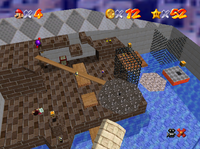 Super Mario 64 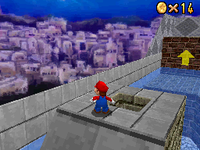 Super Mario 64 DS | |
| How to unlock | Clear Bowser in the Fire Sea. |
| Boss(es) | None |
| Mission(s) | Super Mario 64 Shocking Arrow Lifts! Top o' the Town Secrets in the Shallows & Sky Express Elevator--Hurry Up! Go to Town for Red Coins Quick Race Through Downtown! Super Mario 64 DS Shocking Arrow Lifts! Top o' the Town 5 Secrets in the Shallows & Sky Express Elevator--Hurry Up! Go to Town for the Red Coins Quick Race Through Downtown! Soaked Silver Stars |
| Stars | Super Mario 64: Super Mario 64 DS: |
Wet-Dry World, also known as Wet-Dry Land,[1] is the eleventh course in Super Mario 64 and Super Mario 64 DS. It takes place within flooded ruins, separated into an undeveloped uptown that the player starts in and an underground downtown further into the level. The entrance to the course is the large painting with the Skeeter on it on the Mushroom Castle's second floor. Unique to this course is the ability to raise or lower the water level based on where the painting is entered; the lower the painting is entered, the lower the water level, and the higher the painting is entered, the higher the water level.
This course was used in a Got Milk? commercial in the late 1990s. Mario, who is unable to jump onto a platform in the first area, breaks through the screen, and through a series of events, he winds up in a refrigerator, drinks some milk, becomes supersized, and starts walking on the top of the level. However, the sky is bright blue instead of dark.
Layout
Wet-Dry World's unique stage gimmick is being able to raise and lower the water level by touching the Crystal Taps located throughout the stage. When one is touched, the water level rises or drains to the level of the Crystal Tap's position, which affects the position of the floating platforms as well. Using these Crystal Taps is essential to reach certain areas and complete missions. Several Skeeters slide around on the water surface with flame throwers lining the platforms. If they are underwater, the flame throwers are not able to spit fire. There are two areas to this course: the uptown, which is split into layering platforms, and the downtown area, which has several buildings and the course's Red Coins.
Uptown area
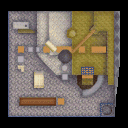
The player starts off on one of the floating platforms in the central area of the course. Directly ahead in the direction the player starts off facing is a large fence that blocks the way to the downtown area, with a Crystal Tap beside it and an elevator shaft nearby. Behind the player's starting position is a wooden bridge with a Purple Switch that leads to a platform with a Crystal Tap when pressed. Below the bridge are another Crystal Tap and several blocks the player can break. North of the bridge behind the large stone structure is a set of tall steps that lead to a Crystal Tap with an Amp circling it. On the ground and in the corner of the steps is a warp that takes the player to the course's cannon. Behind the large structure in the back is a pushable block that can be used to reach a high yellow block.
On the second layer of the area are a Blue Coin Block and a Heave-Ho that the player can use to reach the upper layer. If the floating platforms are low enough, the player can reach some additional platforms that lead to the Power Star of the first mission.
The third layer consists of a platform with a ring of coins around it, an Amp, and a Heave-Ho on the left side, and on the right side, there is a tall elevator shaft with a Purple Switch next to it that causes platforms to appear, leading to the top of the shaft. Against the wall is a pushable block the player can use to reach a yellow block and the next layer of platforms.
From the gap in the platforms of the fourth layer, there is a Crystal Tap to the right and a Chuckya to the left. In the DS version, there is also a Goomba wearing Wario's cap, a red block, and a Bob-omb Buddy, which was moved to this location. Past the Chuckya is a long board with two Amps circling it (one in the DS version). The board leads to a circular platform with both a tube-shaped platform with 1-UP Mushrooms inside and a spinning platform next to it, though the platform spins much more slowly in the DS version. Past the spinning platform is the Power Star for the second mission. On the other side of the map is a lone platform with a Bob-omb Buddy in the original version or a Star Sphere during the mission Soaked Silver Stars in the DS version.
Downtown area
There are three ways to get to the abandoned "Downtown"[2][3] area. The player can launch into a very tall mesh cage with the level's cannon or jump into it when the water level is at maximum high tide (entering the level from the highest point of the painting). In Super Mario 64 DS, Luigi can use the Power Flower to go through the cage at any water level. He can also backward-somersault into it.
Once within the cage, Mario, Yoshi, Luigi, or Wario must quickly swim through a tunnel with partially closed gates before he loses all his health and drowns.
The downtown area consists of several buildings along the walls, a Crystal Tap in an alley, and a central plaza in the center. There is a small church[4]-like building that contains the Star Marker for the course and a pole on top that the player can use to reach a Crystal Tap. In the back left corner is a mesh cage where the player has to turn invisible in order to go inside for a certain mission. The flame throwers on the ground never shoot fire during regular gameplay due to always being partially submerged in water. It is still possible to make them shoot fire by using glitches to lower the water level. They were removed in Super Mario 64 DS.
Missions
| Mission | Appears in | Summary |
|---|---|---|
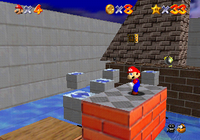 Shocking Arrow Lifts! |
Super Mario 64 Super Mario 64 DS |
This mission's objective is to ride the Arrow Lifts to get the Power Star. |
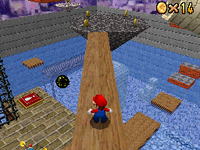 Top o' the Town |
Super Mario 64 Super Mario 64 DS |
The mission's objective is to collect the Power Star at the top of the uptown. |
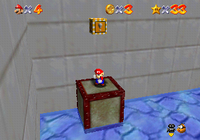 Secrets in the Shallows & Sky (N64) / 5 Secrets in the Shallows & Sky (DS) |
Super Mario 64 Super Mario 64 DS |
This mission's goal is to find the secrets hidden in the uptown. |
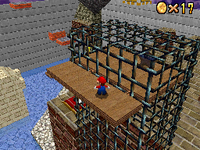 Express Elevator--Hurry Up! |
Super Mario 64 Super Mario 64 DS |
This mission's objective is to collect the Power Star in the elevator shaft. |
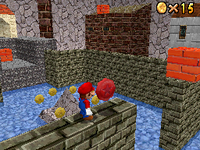 Go to Town for Red Coins (N64) / Go to Town for the Red Coins (DS) |
Super Mario 64 Super Mario 64 DS |
This mission's objective is to collect the Red Coins in the downtown area. |
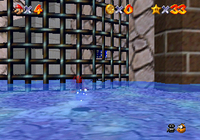 Quick Race Through Downtown! |
Super Mario 64 Super Mario 64 DS |
This mission's objective is to collect the Power Star behind the fence in the downtown area. |
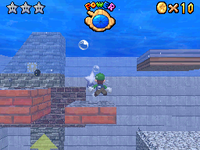 Soaked Silver Stars |
Super Mario 64 DS | This mission's objective is to collect the Silver Stars in the uptown area. |
Enemies
Goomba (DS only)
Statistics from Super Mario 64
- Total Number of Coins: 152 (107 in main course, 45 in downtown)
- Caps Found: Vanish Cap (2), Metal Cap (1)
- Spinning Heart: (none)
- Cannons: 1
- 1UP Mushrooms (4):
- Warps:
- In the outside area, there is a small white structure on the ground with large steps and a Crystal Tap at the top. It has an inset corner on the ground with a warp that leads to the cannon. The water level needs to be as low as possible for this warp to be active.
Gallery
Media
This level uses the same music as the Hazy Maze Cave. Like in the Hazy Maze Cave, the music changes depending on the area in which the player character is (either outside or downtown).
Names in other languages
| Language | Name | Meaning | Notes |
|---|---|---|---|
| Japanese | みずびたシティー[?] Mizubitashitī |
Pun of「水浸し」(mizubitashi, "flooded") and "city" | |
| Chinese (simplified) | 水下遗迹[5] Shuǐxià Yíjì |
Underwater Ruins | |
| French | Monde Trempé-Séché[?] | Soaked-Dried World | |
| German | Atlantis Aquaria[?] | "Atlantis" and "aquaria" (English plural of Aquarium) | |
| Italian | Bagna Asciuga[?] | Wets Dries; pun on Bagnasciuga ("foreshore") | |
| Korean | 물바다시티[?] Mulbada Siti |
Flood City | |
| Spanish | Ciudad Esponja[?] | Sponge City |
Trivia
- One type of texture from this area (used for the unopenable doors in the downtown) was reused in The Legend of Zelda: Ocarina of Time.
- The skybox for this course is composited from altered photographs of Shibam, which is a city in Yemen. The red building near the top is the Mosque of Mohammed Ali in Cairo, Egypt.[6][7] Before this discovery was made, it was believed to be the hillside town of Casares, Spain, due to the similar building layout.[8][9]
- The term "downtown" normally refers to the commercial center in a city, whereas "uptown" is where one would find residencies such as houses and apartments. The "uptown" of Wet-Dry World appears to have much more commercial activity (especially construction), while the "downtown" area contains several homes and what appears to be a central park.
- The name of the 100-Coin Star is Blue Coin Collecting.[10]
References
- ^ July 1997. Nintendo Magazine System (AU) Issue #52. Page 44.
- ^ June 1997. Nintendo Magazine System (AU) Issue #51. Page 48.
- ^ September 1997. Nintendo Magazine System (AU) Issue #54. Page 61.
- ^ Super Mario 64 The Essential Player's Guide. Official UK Nintendo Magazine (British English). Page 21.
- ^ From the score sheet and the Power Star menu of Super Mario 64 DS as localized by iQue.
- ^ Charly Con Nostalgia. NO ERA CASARES, ESPAÑA. Era Shibam, Yemen. Los edificios del Skybox de Wet Dry World en Super Mario 64 es de la ciudad que se le conoce como "El Manhattan del desierto": Shibam Al final ver puro edificio en Google Imagenes si valió la pena:,). X (Spanish). Retrieved May 29, 2024.
- ^ Charly Con Nostalgia. Every piece to Wet Dry World is now found! The building at the top is the Mosque of Muhammad Ali, located in Cairo, Egypt. In a medieval fortification from the Islamic era known as the "Citadel of Cairo" The buildings below ARE NOT from Casares, Spain. they are from Shibam, Yemen. X (English). Retrieved May 29, 2024.
- ^ DidYouKnowGaming? (August 30, 2020). Super Mario 64 - Did You Know Gaming? Ft. Seth Everman (04:49). YouTube. Retrieved May 29, 2024.
- ^ CM30. Mario Trivia Time; Ten More Obscure Mario Facts You Never Knew. Gaming Reinvented (English). Archived November 8, 2020, 13:06:30 UTC from the original via Wayback Machine. Retrieved May 29, 2024.
- ^ Pelland, Scott and Dan Owsen (1996). Super Mario 64 Player's Guide. Nintendo of America (American English). Page 127.
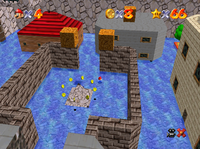
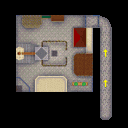

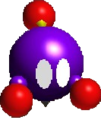

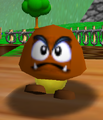
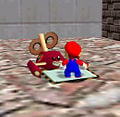









![Skybox texture of a city underwater from Super Mario 64. It is used for Wet-Dry World. The cityscape derives from photographs of Shibam from Yemen and the Muhammad Ali Mosque from Cairo.[1][2]](https://mario.wiki.gallery/images/thumb/4/4c/SM64_Asset_Texture_Skybox_%28Wet-Dry_World%29.png/200px-SM64_Asset_Texture_Skybox_%28Wet-Dry_World%29.png)